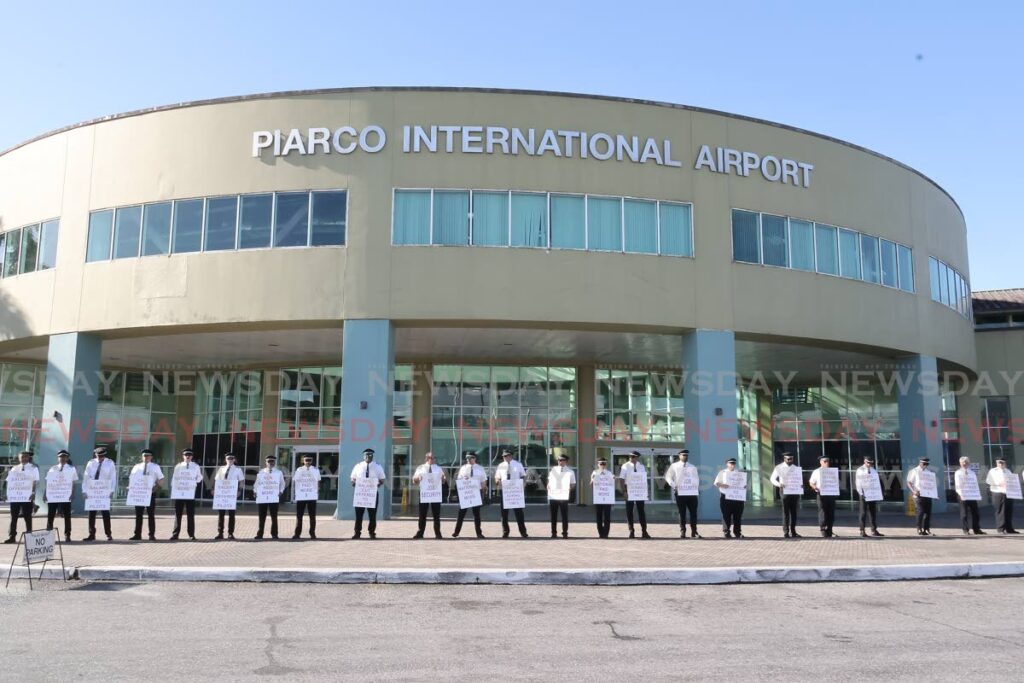Pilots tell CAL: Don't stop paying salaries in US$

THE Trinidad and Tobago Airline Pilots Association (TTALPA) is once again at an impasse with airline service provider Caribbean Airlines Ltd (CAL), as negotiations over the 2015-2020 bargaining period meet another snag.
But TTALPA industrial relations representative Timothy Bailey explained to Newsday on December 10 that the impasse was not about wages, but a clause which allowed for pilots to have a significant portion of their salaries paid in US currency.
He said pilots were calling for CAL to keep their word on the entire agreement, and leave the US$ clause alone.
Bailey said the clause in dispute was article 23 – a memorandum of agreement (MOA) that says pilots are supposed to be paid 75 per cent of their salaries in US currency.
He said the board at CAL was trying to remove that article from the collective bargaining agreement.
Bailey explained that the article, which has been a part of the bargaining agreement for 13 years, maintains parity in the pilot's wages as compared to pilots in other countries.
“In Jamaica, that is how they pay the pilots,” he said. “It would mean that the value of the pilots’ salaries will always be maintained.”
He told Newsday the board at CAL said, “They don’t understand the article.”
Newsday tried to contact CAL through its corporate communications department, but the company referred Newsday to a statement issued on December 9.
“The company continues to work collaboratively with TTALPA to resolve outstanding wage negotiations,” the statement said. It added the signing of the agreement was “imminent.”
During a media conference at the Charlie Davis Lounge at the Queen’s Park Oval in Port of Spain, TTALPA described the status of the negotiations as “derailed,” after the signing failed to happen on December 6 as expected.
Bailey had said the board had tried to have the clause removed before, but during a meeting on November 27, TTALPA reminded the company that trying to exclude articles from the bargaining agreement would be tantamount to acting in bad faith.
Bailey said CAL apologised and said it was done in error. CAL then proposed to amend the draft and reinsert the articles.
Negotiations for this collective agreement began as far back as 2019, TTALPA said in its own statement earlier on December 9.
Back then, TTALPA submitted a proposal to CAL which included a four-per-cent increase to be spread in one-per-cent increments over the four-year period.
“In addition to our recently signed MOA of agreed items, TTALPA’s proposal also maintained residual articles from the previous agreement."
After a period of peaceful picketing by the pilots, Minister of Finance Colm Imbert intervened and approved the salary increase, resolving what was thought to be the final barrier to signing the agreement.
In October, TTALPA shared comparative wages which showed CAL pilots are among the lowest paid in the region.
The statistics showed a CAL captain’s salary is a little less than half (42.41 per cent) the salary of a captain employed with Southwest Airways.
The statistics said CAL jet captains were paid 49 per cent less than a United Airlines captain
Regionally, CAL captains are still paid about nine per cent less than a Cayman Airlines jet captain.
“That means if a Cayman Islands jet captain gets paid a dollar, a CAL captain will get paid 90 cents.”
However, in his statement in October, Imbert said a starter pilot got $22,818 monthly and a senior pilot $94,760, with allowances addedto make "a robust package."
If the pilots were to be paid according to article 23, that would mean the Government would be expected to pay a starter pilot US$2,520.33 and a senior pilot US$10,466.59 monthly in addition to the rest of their salaries in TT$, along with allowances.
"CAL has advised the minister that pilots are compensated through competitive salaries, allowances, and per diem rates...Since 2022, the airline has on-boarded 90 pilots.
"Overall, CAL has advised that pilot salaries account for 33 per cent of the airline’s payroll costs, while the pilot body comprises 13 per cent of the total workforce," a ministry release said in October.
In November amid worsening foreign exchange (forex) challenges in the country, Imbert said he planned to speak to stakeholders on whether the current "honour system" banks used for distribution should be reviewed.
His statement came after public outcry from private citizens and businesses alike over a lack of availability of forex both in cash and for online purchases.
A statement from the Bankers Association (BATT) said banks took their cue on distribution from policies implemented by the Central Bank.
“BATT members operate in compliance with legal regulations, adhering to the Central Bank of Trinidad and Tobago (CBTT) policies and guidelines regarding the allocation and distribution of foreign exchange,” the release said.
The ministry, through Eximbank and other organisations, provided access to forex for SMEs through various facilities.
It said banks get a fixed forex allocation from Central bank and are obligated to sell forex at a specified spread.
This year, Royal Bank of Canada (RBC) announced it was reducing its credit-card US$ limits by 66 per cent. Credit-card holders' monthly limits have been reduced from approximately $41,000 (US$6,020) to $14,000 (US$2,058).
Last September, Republic Bank advised customers of changes to come into effect that month. This involved the US-dollar limit on its credit cards being reduced from US$10,000 to $5,000 per cycle.
In October, Scotiabank announced a reduction in its US-spending limit on its credit cards and stopped the use of its Visa debit card for overseas transactions as it navigates the forex crunch.

Comments
"Pilots tell CAL: Don’t stop paying salaries in US$"